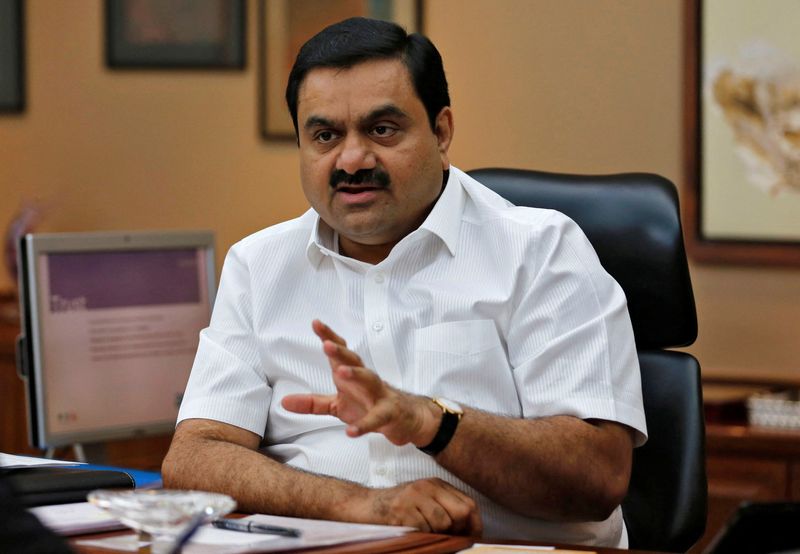By Tom Westbrook and Vidya Ranganathan
SINGAPORE (Reuters) - As Indian tycoon Gautam Adani's woes deepen and force him to drop a share sale, foreign investors and Indian regulators are abandoning any pretence that the conglomerate's troubles are contained and domestic markets will be spared contagion.
Foreign investors, many of them already underweight what they consider an overpriced stock market, are reducing exposure.
India's central bank and stock market regulator have sprung into action more than week after U.S. shortseller Hindenburg Research's report on the Adani Group spurred a rout in its shares, saying they were looking into irregularities and local bank exposures.
Adani's wipeout has the potential to broaden if it drives a bigger mood shift, said Sat Duhra, who manages a $1 billion Asian dividend income fund at Janus Henderson Investors.
"The Indian stock market indices are driven in large part by a small group of companies and any change in sentiment and flows will have a disproportionate impact on indices as more liquid names are sold first," he said.
"We own less than 2% in Indian equities and would need to see a serious correction before we considered adding, especially in light of the recent issues."
Since the Jan. 24 Hindenburg report which alleged improper use by the Adani Group of offshore tax havens and stock manipulation and also raised concerns about high debt, the market capitalisation of seven listed Adani Group companies has fallen by half or nearly $100 billion. Its dollar bonds have tumbled.
To be sure, analysts say, the shock to the system comes because of Adani's heft and influence, rather than exposure. His conglomerate spans ports, coal mines, food businesses, airports and lately media, and before the rout its seven companies had accounted for more than 6% of the National Stock Exchange market value.
While the Adani Group has total gross debt of 2.2 trillion rupees ($26.86 billion), top banks have said their credit exposures to the group are small. Shares of the firm are closely held, mutual funds have low exposure too.
"Everybody’s keeping a very close eye on those debts," said Pankaj Pathak, a fund manager at Quantum (NASDAQ:QMCO) Asset Management in Mumbai. "But on the domestic debt side, we hardly see any impact on the broader corporate bond market because of what is happening in Adani," he said, pointing to the limited ownership of those bonds.
Yet, India's stock market is down 4% in 6 days, and foreign funds have sold $2 billion worth shares since Jan. 24, on top of the $2 bln sold prior to that in January.
"It's an issue of panic, but we don't think it's going to turn into a credit issue," said a credit fund manager in Hong Kong, who could not be named as he was not authorised to speak to media.
"Only Adani Group is trading with these ridiculously high multiples, and that is the core of the problem."
At its peak in December, the flagship Adani Enterprises stock had surged 1,700% in two years.
(Graphic: Adani Group's ballooning debt - https://www.reuters.com/graphics/ADANI-INDIA/lbpggbnompq/chart.png)
REGULATORS WORRY
As regulators step in, banks too are distancing themselves, with Citigroup (NYSE:C)'s wealth unit saying it has stopped extending margin loans to its clients against Adani securities, and Bloomberg News reporting that Credit Suisse had done likewise.
Investors were selling and yet looking for a chance to return.
Investment research firm TS Lombard said the Adani allegations had "hastened the decline we expected in Indian equities as foreign investors rebalance their portfolios on China’s reopening" but that the declines would be limited for several reasons, including Adani being “too unique to fail”.
"At this point in time, I don’t think it’s a systemic risk," said Jimmy Lim, chief investment officer at Modular Asset Management in Singapore. Lim's fund is short Indian stocks, and had no exposure to Adani.
"Having said the above, I would not expect to see a quick resolution on the questions raised and as such there will likely be a sustained period of deleveraging of risk associated with direct and indirect exposures to the name."
David Chao, global market strategist at Invesco, also expects a spell of market fluctuation and volatility.
"We don't think that there's going to be a default anytime soon, although I don't expect any kind of near-term resolution between Adani Group and Hindenburg," Chao said.
Yet Chao expects the selloff to help bring Indian stock valuations to more "palatable levels" for investors.
"The impact on Indian’s broader macro picture is limited. I think, ultimately, this is a fight between two business people."
($1 = 81.8940 Indian rupees)
